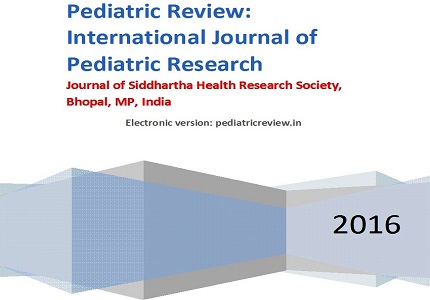Prospective study for newborn hearing screening-A experience from tertiary care centre in central India
Abstract
Background: It is crucial to timely diagnose hearing impairments in infants as early intervention can lead to decrease in morbidity and better prognosis. This study was conducted as an attempt to find the incidence of hearing loss among high risk neonates, normal neonates and associated risk factor that can impair hearing in newborn.
Aims & Objective: Screening of normal newborn delivered in our hospital to assess hearing. Material & methods: It was a descriptive study. A total no. of 1052 babies delivered in our hospital were screened for hearing assessment by 2 staged OAE screening and those who failed the second stage OAE were subjected to diagnostic Brain Stem Evoked Response Audiometry. The data was analyzed and results were compiled. These results were compared with other studies to identify the most likely risk factor associated with childhood hearing impairment.
Results: Among 1052 babies, 254 babies had risk factors for hearing impairment and 20 babies (7.8%) showed hearing impairment, while out of 798 patients without risk factors 9 babies (1.12%) showed hearing impairment.
Conclusion: OAE can be used as a neonatal screening tool as well as for the evaluation of a suspected pediatric population to help diagnose childhood hearing impairment at a very early stage, allowing for the rehabilitation the child within the critical period for speech and language development.
Downloads
References
2. WHO global estimates on prevalence of hearing lossMortality and Burden of Diseases and Prevention of Blindness and Deafnessn WHO 2012. [PubMed]
3. Resnikoff S, Pascolini D, Etya'ale D, Kocur I, Pararajasegaram R, Pokharel GP, Mariotti SP. Global data on visual impairment in the year 2002. Bull World Health Organ. 2004 Nov;82(11):844-51. Epub 2004 Dec 14. [PubMed]
4. World Health Organization. The World Bank. 1. World Report on Disability. Geneva: World Health Organization; 2011.
5. Newborn and infant hearing screening. Current issues and guiding principles for action. Geneva: World Health Organization; 2010.
6. Abraham K.P. Early identification of a hearing loss and centralized Newborn Hearing Screening Facility-The Cochin Experience. Indian Paediatrics. 2011;48(17): 355-359.
7. Augustine AM, Jana AK, Kuruvilla KA, Danda S, Lepcha A, Ebenezer J, Paul RR, Tyagi A, Balraj A. Neonatal hearing screening--experience from a tertiary care hospital in southern India. Neonatal hearing screening--experience from a tertiary care hospital in southern India.
8. Watkin P, McCann D, Law C, Mullee M, Petrou S, Stevenson J, Worsfold S, Yuen HM, Kennedy C. Language ability in children with permanent hearing impairment: the influence of early management and family participation. Pediatrics. 2007 Sep;120(3):e694-701.
9. Kennedy CR, McCann DC, Campbell MJ, Law CM, Mullee M, Petrou S, Watkin P, Worsfold S, Yuen HM, Stevenson J. Language ability after early detection of permanent childhood hearing impairment. N Engl J Med. 2006 May 18;354(20):2131-41.
10. Moeller MP. Early intervention and language development in children who are deaf and hard of hearing. Pediatrics. 2000 Sep;106(3):E43. [PubMed]
11. Kumar A, Shah N, Patel KB, Vishwakarma R. Hearing screening in a tertiary care hospital in India. J Clin Diagn Res. 2015 Mar;9(3):MC01-4. doi: 10.7860/JCDR/2015/11640.5698. Epub 2015 Mar 1. [PubMed]
12. Rughani S, Vyas B, Sinha V, et al: Hearing screening in newborns (a cross sectional study), WAENT.com vol (4)1. 2011.
13. Abraham K Paul. Centralized Newborn Hearing Screening in Ernakulam, Kerala – Experience Over a Decade. Indian Pediatrics. 2011:May (48):355-59. [PubMed]

Copyright (c) 2016 Author (s). Published by Siddharth Health Research and Social Welfare Society

This work is licensed under a Creative Commons Attribution 4.0 International License.


 OAI - Open Archives Initiative
OAI - Open Archives Initiative


